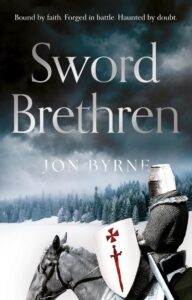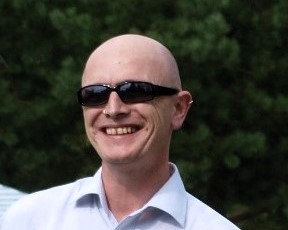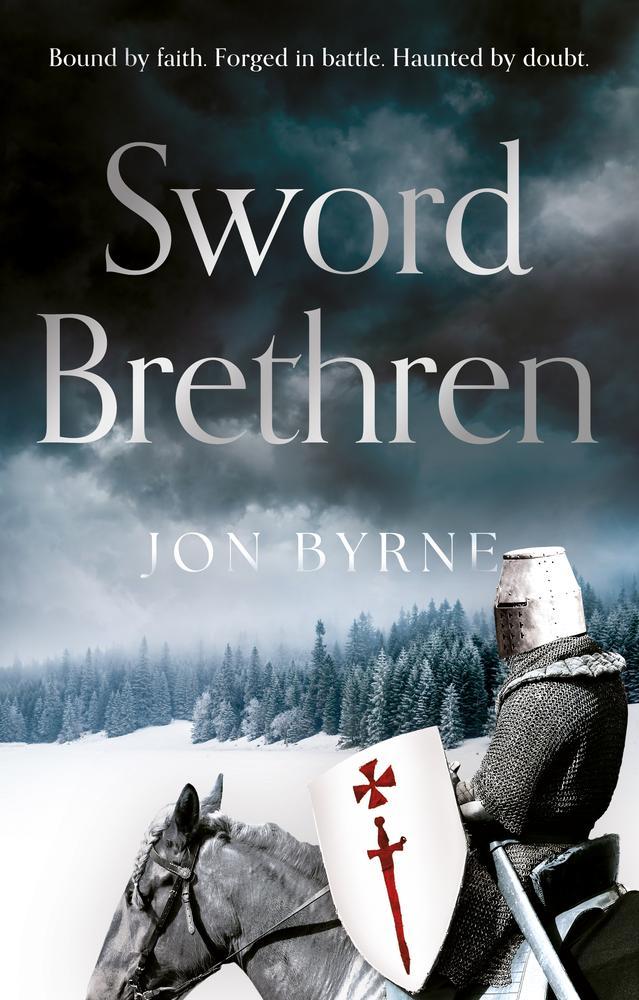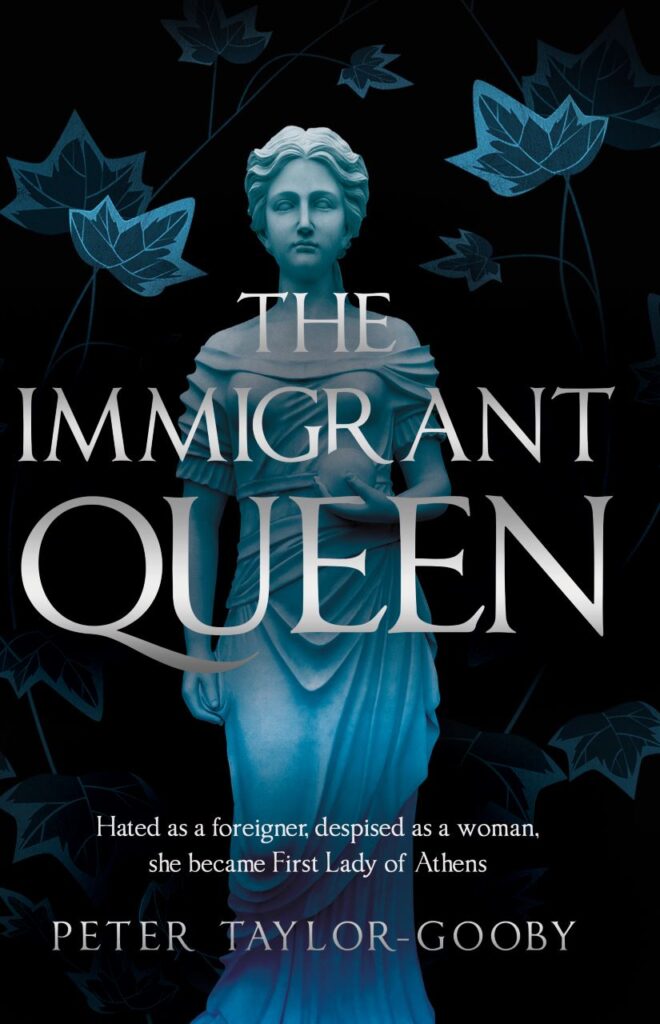Launch: Jon Byrne’s Sword Brethren
INTERVIEW BY DAVID CONNON
Jon Byrne, originally from London, now lives with his German family by a lake in Bavaria with stunning views of the Alps. As well as writing, he works as a translator for a local IT company and occasionally as a lumberjack. He has always been fascinated by history and has studied the medieval world for over twenty years, building up a comprehensive library of books. Sword Brethren (formerly Brothers of the Sword) made it to the shortlist of the Yeovil Literary Prize 2022 and the longlist of the prestigious Grindstone International Novel Prize 2022.
What is your “elevator pitch”?
Richard’s young life is upturned when he loses his castle home due to treachery. Forced to flee to Lübeck, he joins a crusade to convert the pagans of the eastern Baltic. Here he must come to terms with his new life of prayer, danger and duty – despite his own religious doubts, with as many enemies within the fortified convent as the wilderness outside. But when their small outpost is threatened by a large pagan army, Richard is compelled to make a crucial decision and fight like never before.
 What inspired you to start writing? And how does your occupational background affect your writing?
What inspired you to start writing? And how does your occupational background affect your writing?
I was inspired to start writing when I lived in India approximately twenty-five years ago. I was staying in a hotel room in Jaisalmer that was built into the city fortifications and had (blunt) swords on the wall. I hadn’t really written anything since school, but once I started I couldn’t stop, loving every moment as the words flowed, finally retiring to bed at 3 a.m. This became my first fantasy novel, and I finally finished the writing and editing one year later. I sent it to a few agents, and, apart from some interest, it was never picked up. I then wrote two further fantasy novels, the last being a monster of over 200,000 words, none of which I ever attempted to publish. I have also written approximately 10 (mostly fantasy) short stories, two of which were published in the United States. All of this I consider to have been my apprenticeship.
My occupation doesn’t really affect my writing. I live in Germany, and writing is a welcome distraction from my normal job of working as a translator for an IT company. I normally write in the evenings and over the weekend, but I can go days without writing anything.
How did you come to write Sword Brethren?
I have always been fascinated by medieval history, but I became interested in this particular era after reading The Northern Crusades by Eric Christiansen and learning about the German Order of Swordbrothers (Schwertbrüderorden). What intrigued me was that they were a small Order, not very pious or saintly. They were unorthodox and argued constantly with Bishop Albert, the leader of the Christian mission. They were a rough and ready lot, acting more like brigands than warrior monks. The first master was murdered by one of the brothers, and they locked up their second master when he tried to exert more control over their behaviour. Over time, they were accused of almost every crime.
How did you choose an elderly warrior monk to narrate the story?
I thought that framing the story with Richard, the protagonist, being a captive of the Russian Prince Alexander Nevsky of Novgorod, would be more interesting than just a chronological account of the prince’s life. Richard recounts his tale to the prince’s scholar who is tasked with writing a chronicle. My goal was to show Richard as an older and irascible, but wiser man, looking back on the impetuousness of his youth. The two timeframes allowed me to bring in Prince Alexander Nevsky – a hero from Russian medieval history, and a fascinating man in himself. Chronicle writing fit the spirit of the times in medieval Novgorod.
Your action scenes and swordplay remind me of the masterful Bernard Cornwell. Can you share any tips for writing engaging scenes?
I take that as a massive compliment because Bernard Cornwell writes some of the best fight and battle scenes in all historical fiction. I think writing action scenes is a delicate balance between letting the reader know what is happening and maintaining the pace. Judicious use of the senses helps transport the reader back in time. Readers need to experience what the characters smell, taste, see, hear, and feel. But readers also need to be engaged enough to care about what is happening, in spite of the intense, often graphic nature of battle scenes. After all, warfare is an important element of the historical action/adventure genre.
What was the most enjoyable part of researching or writing your book?
Travelling to all the places in the novel was the most fun. My family and I spent a wonderful week in Latvia visiting the places from the book. Lübeck is also an amazingly preserved medieval city that oozes charm and inspiration. I have also bought dozens of books on the period to make the setting as historically accurate as possible.
In the course of writing Sword Brethren, what have you learned about the human condition?
Authors must learn to come to terms with rejection. Writing a finished book – even if it is never published, is an achievement in itself. But unfortunately, apart from some friends and family, most other people are not really interested. There are so many books published each year that it is very hard to stand out from the crowd.
Perseverance and endurance is also an important trait to have: Don’t give up hope that your book will eventually find a home if it is good enough. Everyone’s experience is different. Sword Brethren went through two name changes and was sent to dozens of literary agents in the UK and US before finally being accepted. Writers must learn not to let rejection put them off. Do not give up if you have confidence in your work.
 What is your next project, and how far advanced is it?
What is your next project, and how far advanced is it?
Sword Brethren is the first book in The Northern Crusader Chronicles. I have since finished the second book, Soldier of God, and am now writing the third installment in the series. Soldier of God was well received by beta readers and needs some more editing before being ready to publish.
At the moment, it’s an interesting time of different stages for me: my debut is being published, the second needs editing, and I’m writing the third from scratch. Whatever mood I’m in, there is something to do. Unfortunately, I write slowly, and I mostly edit as I go along – something that most authors advise against. But it works for me. Writers are different and have to do what’s right for them.
What is the last great book you read?
Although not strictly a historical novel, I recently reread The Second Sleep by Robert Harris. Harris has written many historical fiction books in his career, from many different periods of history. He is an accomplished author. I particularly enjoyed his trilogy on Cicero, starting with Imperium.
HNS Sponsored Author Interviews are paid for by authors or their publishers. Interviews are commissioned by HNS.
![]()






